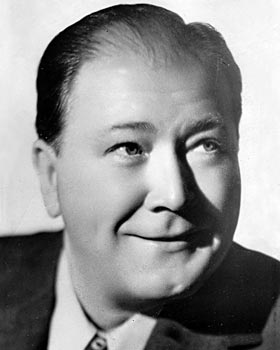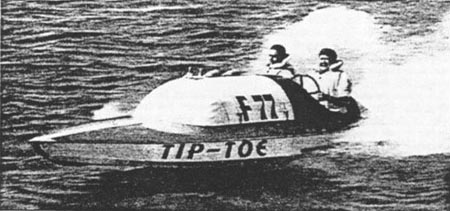John Charles Thomas
John Charles Thomas: The Boating Baritone

When John Charles Thomas was a boy he used to stroll with his father beside the upper reaches of the Potomac near their home in Western Maryland, or slide over its placid current in a borrowed skiff. As father and son explored quiet coves and leafy backwaters, afoot or afloat, the lad used to dream of one day owning a rowboat of his own. To the boy a boat of any sort was something worth living for, a far distant, perhaps unattainable luxury; the Thomases had other uses for money in those times.
But passing years, a wife and a glorious voice have made the day-dreams of youth come true. The barefoot boy of the Potomac to whom a skiff once loomed as large and as remote of achievement as J. P. Morgan's Corsair, is now a yachtsman who owns not one boat, but half a dozen of assorted sizes, shapes and uses. His flagship is an 85-foot cruising houseboat and his fleet includes racing runabouts and hydroplanes, a fishing skiff and a rowing dinghy.
He is no longer a landsman envying those who could claim ownership of so questionable a floating asset as a square-ended river punt. He lives afloat and plays afloat. His New York apartment is merely an office from which he conducts the business incident to his appearances on the stage of the Metropolitan Opera, the concert platform and before the radio microphone.
John Charles Thomas, at the zenith of a brilliant musical career, is a boating baritone, a singing seafarer, an operatic oarsman, if you will.
You have to go back nearly eleven years, to 1925 to be exact, to put your finger on the time when the boating bug began to infect John Charles Thomas seriously. That summer, Thomas and his bride, a charming St. Louis brunette with no more seagoing background than himself, took a cottage in Beverly Farms, Mass., right on the Bay State's lovely North Shore.
The entrancing shoreline, the goings and comings of all manner of yachts stirred some latent love of the sea in the Thomases. To quote J. C. T. "We got rash, chartered a 48-footer for two weeks, took my father- and-mother-in-law along and went cruising and fishing. From that time on we simply itched for more of it." Thomas had found that his wife was going to be no yachting widow. She was as keen for the water as himself.
But the dictates of a musical career prevented their doing anything about developing the boating urge. For years they lived in Brussels while John Charles studied, worked and fought his way up the long, perilous ladder to operatic fame and recognition.
A little more than two years age they returned to this country with John Charles Thomas firmly established in the front rank of operatic artists. With success had come money and with money had come the means of making realities of boating dreams.
So the Thomases began looking at boats with a view to purchase. John Charles estimates that he must have inspected at least 250 yachts from 65 feet in length upward. He haunted shipyards, yacht brokerage offices and pored over advertisements in the boating magazines. He drove brokers to distraction. Finally one of them somewhat querulously demanded : "What kind of boat do you want anyway?"
Thomas had no clear idea, but he went with the broker to City Island to look over Masquerader, an 85-foot, comfortably appointed cruising houseboat once owned by Caleb Bragg.
He bought it, put it into commission and has been living on it ever since. "I have no home but that boat," Thomas says. "My apartment in New York is only an office, or a substitute for a hotel when business keeps me in the city. Harry Lowrey, an old bayman from the Chesapeake is my captain, the major domo of my mobile home. He has orders to keep her ready to go anywhere at a moment's notice. Masquerader takes me to trains and meets me when I climb off them. She goes with me on my vacation. Every May and June I go fishing in Florida, spending my holiday in the Keys.
"Masquerader is our home. Some day I suppose we shall have to take a house ashore and then I shall have to replace Masquerader with a smaller vessel, one less expensive to maintain, because it will run into too much money to keep up two homes, one ashore and one afloat." He tells you that with a trace of regret in his resonant voice. You get the impression that he is not looking forward to the day when he will be partially landbound.
Within less than a year, Thomas has become an outstanding figure in American motorboat racing, another result of a combination of circumstances with generous impulses.
Masquerader was in Miami last spring having a modern refrigerator installed to replace her enormous old ice boxes. John Charles was lounging on deck when a chap whizzed by in a high-speed runabout, cut his throttle and heaved along-side.
"That's a nice looking boat you have there, mister," said Thomas.
"Sure is," answered the driver. "Why don't you buy one?"
"I don't buy anything until I've tried it out," replied the singer-sailor. And so it came to pass that Thomas went for a speedboat ride, succumbed to its thrill and placed an order for a Class E racing runabout, a 25-foot fishing skiff and an 18-foot runabout for taxi and tender purposes.
The racing runabout was delivered last summer and made its debut in the historic Miles River Yacht Club regatta at St. Michaels, Md., on the Eastern shore that is Masquerader's headquarters, if such an itinerant craft can be said to have headquarters.
Let Thomas tell about his first race. "Maude Rutherfurd, Jack's wife you know, rode with me in that Miles River race. We won it and I went nuts over racing. We won every race we went in the rest of the season until we got to Washing-ton where Maude bobbed up with her new blue and white Imp II and beat me. Had to break the record to do it, too."
Briefly, that is the saga of Myne, one of 1935's outstanding racing runabouts. John Charles is planning to avenge his defeat by Maude. Last winter he ordered a Century Class E runabout which will be known as Myne II and campaigned over the Eastern circuit this summer. And he hopes to give
[text missing]
of Dover, N. J.
Myne II carries the racing number E-77. The 225, Tip-toe is number F-77. Why the 77? That was the number worn on the football jersey of Red Grange, the galloping ghost of Illinois. John Charles hopes that his boats will be as elusive, as swift afloat as the hero of the Illini was on the gridiron.
Thomas’s enthusiasm for racing gave to the American Power Boat Association a new trophy, as intrinsically valuable as it is beautiful, a huge, engraved sterling silver tray that henceforth will be the national championship emblem in the 225 class. He presented it to the association formally in January and has worked out the conditions gemming competition for it with Charles F. Chapman, secretary of the A. P. B. A. racing commission. There is every indication that it will become one of the most important and most strived for prizes in the history of American speedboat racing.
Now for a brief survey of the Thomas navy, built up in partnership with a wife who encourages rather than resigns herself to her husband's boating enthusiasm, and financed through the achievement of a youthful ambition to become one of the world's foremost singers. There is a story in the names of the Thomas boats alone.
Masquerader. That name was retained because, as Thomas says, "We are masquerading as rich people. We aren't, but we can live like them on Masquerader."
Myne. "Everybody bosses me around on Masquerader, so when I got the racing runabout I said: 'This is mine, my boat.' Hence the name."
Half Dot's. "That the fishing boat. Dorothy, my wife, said : 'You've got Masquerader, a speedboat and a runabout. Where do I come in?' She comes in half on the fishing launch."
My Own. "The rowboat. I came home one day and found the rowboat all painted up new and on the transom was inscribed : 'My Own, signed Dorothy.' I think that is self-explanatory. Dorothy had to have one boat that was hers alone. That's it."

Tip-Toe. "You know how a hydroplane gets up on its plane and treads sort of lightly over the water? Well, Mrs. Thomas has a habit of walking around on tip-toe, ever so lightly and quietly so as not to disturb me when I'm studying or going over things with my business people. So, really, I've named the new 225 for Dorothy."
Keep an eye and an ear on John Charles Thomas in 1936. When his rich, gifted voice isn't pouring out over the foot-lights of the Metropolitan and the concert stage, when it isn't coming to you over the ether waves, it will be giving quiet instructions to his racing mechanics or raising itself in shouts of victory amid the spray and spume of the water race courses.
The boy who once dreamed on the Potomac of one day having money enough to own his own rowboat, is now a racing yachtsman setting new goals to attain on the waterways he roams at will.
—Everett B. Morris
(Reprinted from Motor Boating, April 1936, pp. 33, 88-9)
